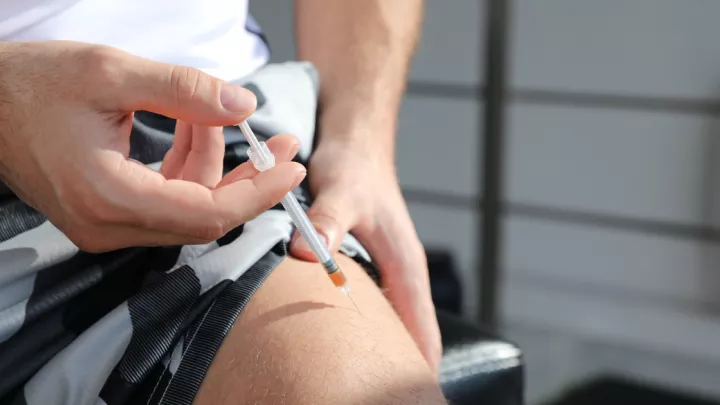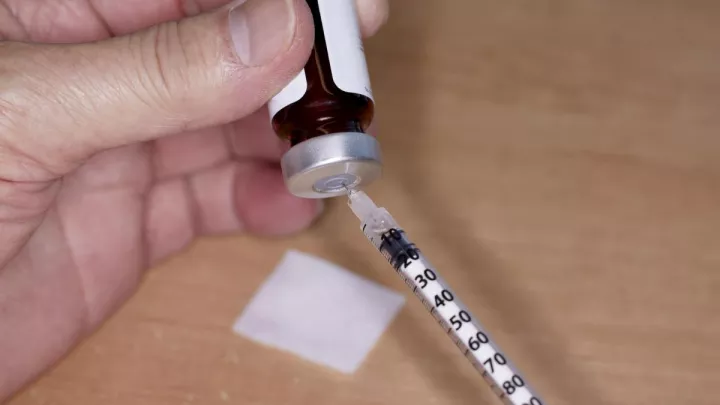Low T-like symptoms could signal something more serious


If you listen to the media, you might think all men suffer from low testosterone, or low T.
But that’s far from the truth.
While it’s true that most men will experience a slight drop in testosterone production each year after 40, the facts are:
- Only about 14% of men suffer from low T, which is clinically significant
- Only about 5% of the above group has symptoms severe enough to warrant treatment
The challenge in diagnosing low T is it can cause symptoms similar to other health problems, like sleep apnea or depression. These include:
- Low motivation
- Decreased stamina and energy
- Low sex drive
- Depression
- Hot flashes
- Loss of muscle mass
- Mood swings
How we can help
At the Nebraska Medicine Men’s Health Program, we help men with low T and other health problems. We also treat male health conditions, such as erectile dysfunction. Our clinic is staffed by a urologist and other health care providers who specialize in men’s unique health problems, and we are committed to getting to the root of your problem.
Not only are we going to test your testosterone levels, but we are also going to check for other diseases that are often associated with low T that may need treatment, including:
- Diabetes
- High lipids
- High cholesterol
- High blood pressure
- Coronary artery disease
While one does not appear to cause the other, these conditions tend to co-exist.
If we were only to treat your low T and not the co-existing problems, you would never reach your optimal health. If we find other health problems, we can refer you to providers in internal medicine, endocrinology, cardiology or pulmonology to ensure comprehensive care for your condition(s).
This is why testing for low T should always involve a thorough physical exam and medical history to rule out other explanations for your symptoms. We will also make sure you are up to date on other age-appropriate screenings, like prostate or colorectal screening.
Getting it right
It is important to be diagnosed and treated properly, as testosterone replacement therapy can:
- Cause blood clots
- Cause stroke, heart or liver toxicity
- Raise red blood cell count
- Enlarge males’ breasts
- Accelerate prostate growth
We will not treat you for low T if it's unnecessary. You should also be screened for prostate cancer before receiving testosterone therapy. While testosterone therapy does not cause prostate cancer, it can cause it to grow faster.
Testing for low T
A simple blood test can confirm your testosterone level. The bottom of a man's normal total testosterone range is about 300 ng/dL, and the upper limit is about 800ng/dL, depending on the lab. In general, levels below 300 ng/dL combined with symptoms are indicators of testosterone deficiency.
If it is determined that you may benefit from testosterone therapy, we take this seriously. In men who have severe symptoms, getting treatment can be life changing.
How is low T treated?
Several types of therapy have proven effective. One of these is an oral prescription therapy called clomiphene citrate, which stimulates the body to produce more testosterone. This therapy is effective in about 70% of men.
The most effective treatments are synthetic testosterone replacement therapies. These are administered with one of the following:
- A gel application to the upper arm
- A daily patch on the shoulders
- Self-injections every couple of weeks
- Pellets placed under the skin in the lower back that last three months or more
Replacement therapies that should not be used include over-the-counter testosterone boosters and bioidentical therapies – neither are regulated, tend to have more variability in the actual testosterone potency and are rarely effective enough to produce significant results.
Synthetic replacements, on the other hand, are made of chemicals and compounds in a lab that mimics the same structure and chemical composition of hormones produced by the body and is far more accurate, safer and effective.
If you have been feeling fatigued, moody or depressed lately, come in for an evaluation. It could be your testosterone or something more serious. Whatever the case, we will get to the root of your problem and help return you to your optimal health again.
We'll help you find out why. Please call 800.922.0000 to schedule an appointment with one of our men's health experts.







